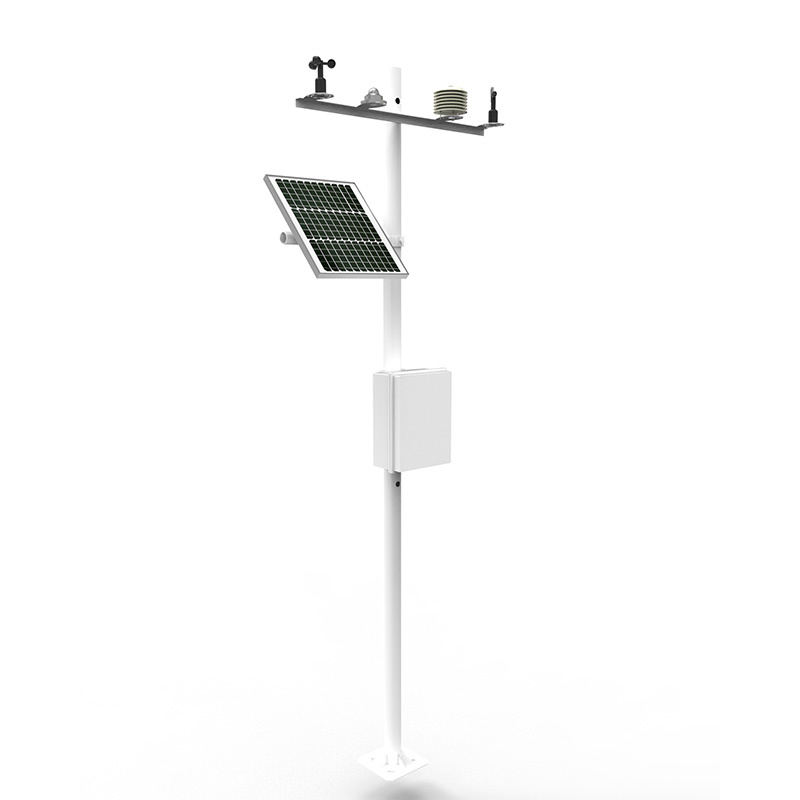Meteorological environment monitoring equipment supplier
Insist on doing high-precision customer favorite technology products

1.Scope of Application of Photovoltaic Environmental Monitoring Station Scheme
The photovoltaic environmental monitoring station uses a high-stability total solar radiation sensor. The photovoltaic environmental monitoring station is based on an automatic weather station. Element data monitoring. Distributed photovoltaic power generation refers to photovoltaic power generation facilities that are built and operated at or near the user's site, mainly for self-use on the user's side, with surplus electricity connected to the grid and balanced and regulated in the distribution network system. In order to ensure the normal operation and data analysis of photovoltaic power plants, it is usually necessary to equip a distributed photovoltaic power generation environmental monitoring system to monitor indicators such as total solar radiation, ambient temperature, wind speed and direction, and photovoltaic module temperature. The distributed photovoltaic power generation environmental monitoring system can be connected to the monitoring system. The monitoring system can display, record and analyze the data of the environmental monitoring system. It can also be connected to the inverter control system, and the control system can analyze the sensor data to ensure Effective operation of photovoltaic power plants.
2. Product Description of Photovoltaic Environmental Monitoring Station
The photovoltaic environmental monitoring station meets the requirements of the national standard and meets the latest data requirements and logical correspondence of the provincial inspection of the photovoltaic power station, and supports the secondary upgrade of subsequent new parameters. A highly stable total solar radiation sensor is used, which has perfect cosine characteristics, fast response, zero offset and wide temperature response performance, ensuring accurate and stable radiation data. Our company has many years of rich experience in serving domestic and foreign photovoltaic power station users, sufficient sensor inventory, complete production lines, mature equipment debugging technical capabilities, all-round after-sales tracking service, and fast logistics and transportation system.
3. Typical applications of photovoltaic environmental monitoring stations
1. Solar photovoltaic power generation, solar resource assessment
2. Solar system monitoring and atmospheric energy balance research
3. Calibration and verification of solar radiation data retrieved by satellites
4. Thermal stress research, heat exchange research, climate change research
5. Estimation and processing of optical resources in the initial stage of the power station, and revenue evaluation
4. Product Implementation Specifications for Photovoltaic Environmental Monitoring Stations
The site selection of the distributed photovoltaic power generation environmental monitoring system needs to consider many factors. The site should be built in a place that is not shaded from sunrise to sunset throughout the year. Based on international observation methods, national observation specifications, power industry standards and years of rich experience in site selection and environmental monitoring system installation and commissioning, our company provides detailed and professional specification guidance documents for relevant personnel of photovoltaic power stations.
5. Product Technical Parameters of Photovoltaic Environmental Monitoring Station
Model: FT-FGF9
Power supply: DC12V
Output: RS485 MODBUS RTU protocol
Power supply mode: solar power supply/DC12V/AC220V/UPS
Baud rate: 4800—115200 Default baud rate: 9600
Working temperature: -30°C~+70°C
Storage temperature: -40°C~+80°C
Working humidity: 0~100%RH
Protection class: IP65
Communication mode: Wifi/GPRS/RS485/wireless point-to-point
Output aviation plug: IP68 SP13-6
Data receiving mode: wireless data cloud platform APP/PC/webpage wired stand-alone software secondary development communication interface
Bearing form: fixed bracket 1.5m/2.2m/3m
6. Photovoltaic environmental monitoring station detection data parameters
| sensor name | Measuring range | Accuracy | resolution |
| ambient temperature | -40—123.8°C | ±0.1℃ | 0.1°C |
| environment humidity | 0—100%RH | ±2%RH | 0. 1%RH |
| maximum temperature | -40 —123.8C | +0.1℃ | 0.1°C |
| lowest temperature | -40 —123.8C | +0.1℃ | 0.1°C |
| dew point temperature | -40—123.8°C | +0.1℃ | 0.1°C |
| wind speed | 0—60m/s | Soil 2% (W20m/s ), ± 2%+0. 03V m/s (>20 m/s ) | 0. Im/s |
| 2 minutes wind speed | 0—60m/s | ± 2% (W20m/s), +2%+0. 03V m/s ( >20 m/s ) | 0. Im/s |
| 10 minutes wind speed | 0—60m/s | ± 2% (W20m/s), +2%+0. 03V m/s ( >20 m/s ) | 0. Im/s |
| wind direction | 0—359° | ±2° | 1° |
| barometric pressure | 300—1100hPa | ±0. 12hPa | 0. 1hPa |
| Component temperature | -40—100C | ±0.1℃ | 0.1°C |
| total horizontal radiation | 0—2000w/m2 | W5% | lw/m2 |
| total horizontal radiation day accumulation | 0—999.9MJ/m2 | W5% | 0. IMJ/ni2 |
| Horizontal Total Radiation Monthly Cumulative | 0—9999MJ/m2 | W5% | lMJ/m2 |
| Total Horizontal Radiation Annual Accumulation | 0—9999MJ/m2 | W5% | lMJ/m2 |
Design Implementation Standards
"Guidelines for Meteorological Instruments and Methods of Observation" World Meteorological Organization (WMO) Committee for Instruments and Observation Methods (CIMO) and IEC (International Electrotechnical Commission) State Grid Corporation of China Enterprise Standard Q/GDW 617-2011 "Technical Regulations for Connecting Photovoltaic Power Plants to the Grid" State Grid Corporation of China Enterprise Standard Q/GDW 618-2011 "Test Regulations for Connecting Photovoltaic Power Stations to the Grid"
"Technical Specifications for Engineering Acceptance of Grid-connected Photovoltaic Power Generation System"
"QX/T61-2007 Specification for Surface Meteorological Observation" "QX/T-2000II Automatic Weather Station Industry Standard"
"QX/T74-2007 Wind Farm Meteorological Observation and Data Review and Correction Technical Specifications"